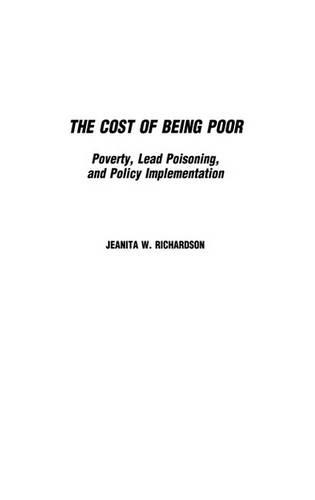
The Cost of Being Poor: Poverty, Lead Poisoning, and Policy Implementation
(Hardback)
Publishing Details
The Cost of Being Poor: Poverty, Lead Poisoning, and Policy Implementation
By (Author) Jeanita Richardson
Bloomsbury Publishing PLC
Praeger Publishers Inc
30th September 2005
United States
Classifications
Professional and Scholarly
Non Fiction
Personal and public health / health education
Child welfare and youth services
362.5
Physical Properties
Hardback
222
Description
Social problems, such as childhood lead poisoning, do not occur in a vacuum. As such, the definition of the problem requires a holistic examination of the broad social, political, and economic influences that create and perpetuate the issue of concern. Richardson does this with eloquence and heart. She also investigates the attitudes various groups have held toward the Residential Lead-based Paint Hazard Reduction Act (Title X). In doing so, she reveals much about the attitudes officials hold in general toward problems affecting poor communities and demonstrates how these attitudes directly affect policymaking and policy enforcement. The social consequences of lead poisoning analyzed in this volume fall into the following categories: Housing Health Education Policy-making Legal Challenges The Cost of Being Poor would be useful to individuals in the fields of public health, policy, education, and law. Furthermore, this work would be of special use to educators, who would benefit from familiarity with lead poisoning as a factor in their students' lives and from becoming aware that there are options that poisoned children have to improve their situation. The first step necessary in eliminating social problems is to understand the nature of the problem. This study is a step in that direction.
Reviews
"Endorsement From Michael G. Phelan, trial lawyer representing families of lead poisoned children: Dr. Richardson correctly observes that "poor children in particular are utterly subject to policy and politics." [She] is an important voice for a segment of our society who, unfortunately, has no lobby at our General Assembly or Congress. The sad truth exposed by Dr. Richardson is that poor families are helpless....Government action is not triggered until a child tests positive for lead poisoning, by which time the child has been permanently damaged. The goal must be prevention, not after-the-fact treatment....Kudos to Dr. Richardson for addressing this important issue."
Author Bio
JEANITA W. RICHARDSON is Associate Professor, Department of Educational Leadership, School of Liberal Arts and Sciences, Virginia State University.
